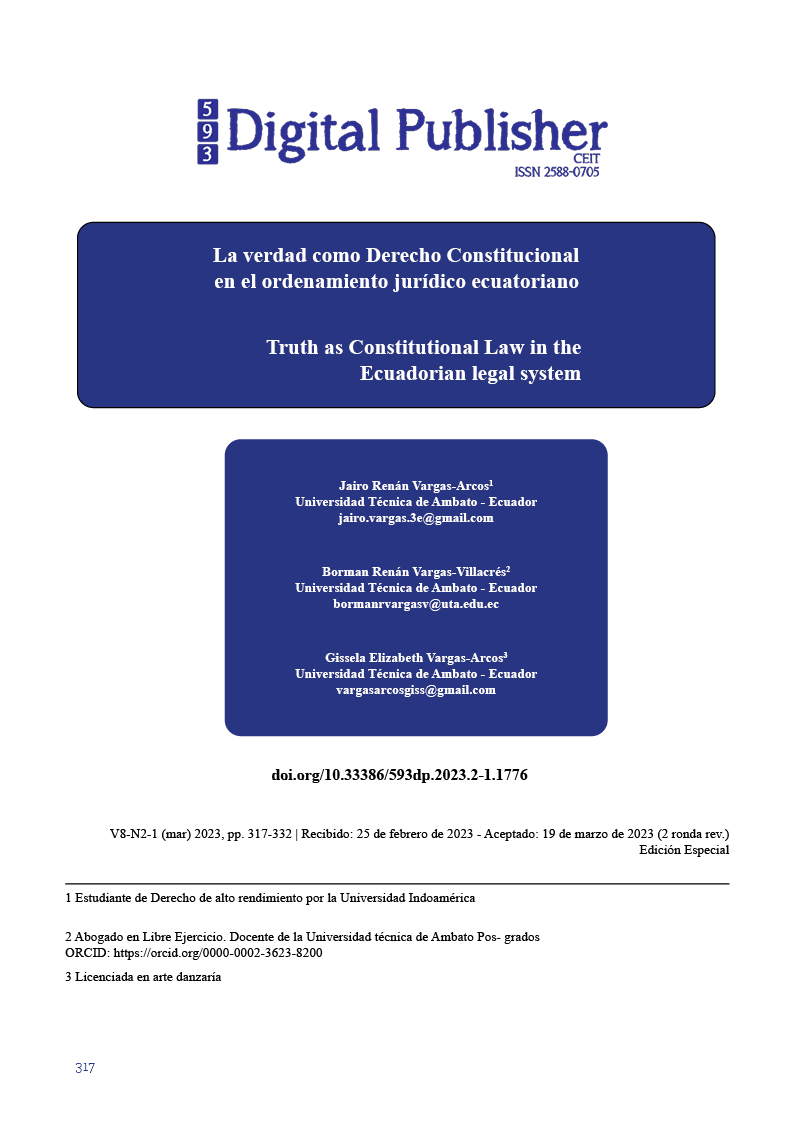Truth as Constitutional Law in the Ecuadorian legal system
Main Article Content
Abstract
Societies since its inception have been concerned with understanding and comprehending certain phenomena, be they physical, social or biological, with which the reasoning of the human being who is concerned with giving meaning to all these manifestations intervenes. The concern is generated by admitting an act or fact as something valid that is accepted by all peers, so that it has a category of admissibility and although its presence is discussed, it is at least considered by a majority. Thus begins the existence of the truth that has varied meanings depending on its semantic origin, but that all of them begin by unraveling the essence of an object or an externalization, but at the same time they are conditions of social coexistence and even a way of reaching the freedom. Of course, the philosophical ideal is precisely that there is a correspondence between the human conception and the object that is analyzed; but this effort is not easy, on the contrary, it will depend even on the subjective criteria of each individual.
Downloads
Article Details

This work is licensed under a Creative Commons Attribution-NonCommercial-ShareAlike 4.0 International License.
1. Derechos de autor
Las obras que se publican en 593 Digital Publisher CEIT están sujetas a los siguientes términos:
1.1. 593 Digital Publisher CEIT, conserva los derechos patrimoniales (copyright) de las obras publicadas, favorece y permite la reutilización de las mismas bajo la licencia Licencia Creative Commons 4.0 de Reconocimiento-NoComercial-CompartirIgual 4.0, por lo cual se pueden copiar, usar, difundir, transmitir y exponer públicamente, siempre que:
1.1.a. Se cite la autoría y fuente original de su publicación (revista, editorial, URL).
1.1.b. No se usen para fines comerciales u onerosos.
1.1.c. Se mencione la existencia y especificaciones de esta licencia de uso.
References
Borbor, V. (2023). La seguridad jurídica en el ordenamiento constitucional Ecuatoriano. FIPCAEC, 8(1), 22–37.
Coronel, M. (2019). El principio de libertad de expresión en las redes sociales y su regulación en el ordenamiento jurídico ecuatoriano. Revista Científica ECOCIENCIA, 4(2), 1–24.
Díaz, B. (2020). Hacía una nueva conceptualización de la bioética y aplicación de sus principios en el ordenamiento jurídico. Derecho y Realidad, 18(36), 239–251. https://doi.org/10.19053/16923936.v18.n36.2020.12166
Ferrari, G. (2020). Rights and freedoms in Latvian constitutional law. DPCE Online, 4(22), 2113–2123.
Germany, F. (2023). Multidisciplinary Constitutional Law Scholarship from Germany and the EU an. Law Development Journal, 4(1), 1–31.
Jaramillo, J., & Burbano, A. (2023). Derechos constitucionales en niños, niñas y adolescentes en Ecuador. KAIRÓS, 6(10), 52–73.
Londa, V., Pangemanan, F., & Tulusan, F. (2022). Implementation of Information and Communication Technology Systems in the State Administrative Law System. International Journal of Artificial …, 6(1), 1–7. https://doi.org/10.29099/ijair.v6i1.384
Pachot, K. (2021). El derecho constitucional al deporte en el Derecho comparado. Arrancada, 1(1), 159–175. https://doi.org/10.2139/ssrn.3875523
Perlaza, P., Rivera, L., & Ronquillo, O. (2021). Los derechos constitucionales en el debido proceso penal del sistema ecuatoriano. CIENCIAMATRIA Revista Interdisciplinaria de Humanidades, Educación, Ciencia y Tecnología, 7(1), 376–382. https://doi.org/10.35381/cm.v7i1.539
Ronquillo, O., Ojeda, P., & Panchi, W. (2021). La igualdad ante la ley como derecho constitucional en Ecuador. Cienciamatria, 7(1), 498–508. https://doi.org/10.35381/cm.v7i1.559
Sanabria, M. (2022). El derecho al retracto y sus inconsistencias dentro del ordenamiento jurídico colombiano. Precedente. Revista Jurídica, 22(4), 143–175. https://doi.org/10.18046/prec.v22.5541
Saputra, R., Zaid, & Emovwodo, S. (2022). The Court Online Content Moderation: A Constitutional Framework. Journal of Human Rights, Culture and Legal System, 2(3), 139–148. https://doi.org/10.53955/jhcls.v2i3.54
Srinu, G., & Mallikarjuna. (2023). The legal system in India : A historic perspective. International Journal of Sanskrit Research, 9(1), 73–75.
Suroto. (2022). Implementation of E-Voting According to the Perspective of Constitutional Law. International Journal Of Artificial Intelegence Research, 6(1), 1–7. https://doi.org/10.29099/ijair.v6i1.372
Szentgali, B. (2022). Contemporary Central & East European Law A concept at the edge of national and European constitutional law : different understandings within the same region. Constitutional identity in Poland and Hungary. Contemporary Central & East European Law, 1(1), 1–20.
Taha, M. (2022). The Judicial System in the Federal State U.S as a Model. Baltic Journal of Law and Politics, 15(1), 45–62. https://doi.org/10.2478/bjlp-2022-00004
Topildiyeva. (2023). Overview of the history of the court system in Uzbekistan. Eurasian journal of social sciences, philosophy and culture, 3(1), 1–5.
Zamora, A., & Ávila, F. (2022). La violencia vicaria contra la madre, su falta de regulación en el ordenamiento jurídico ecuatoriano. CIENCIAMATRIA Revista Interdisciplinaria de Humanidades, Educación, Ciencia y Tecnología, 8(8), 1441–1458. https://doi.org/10.35381/cm.v8i4.1009




